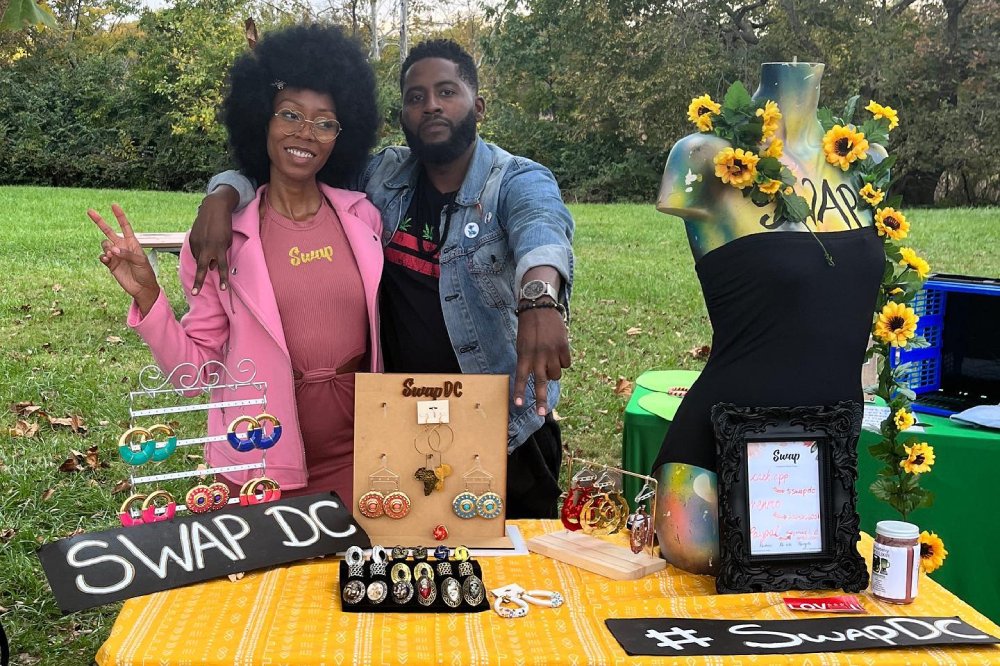Life
 Photo from fb.com/swapmoredc/photos.
Photo from fb.com/swapmoredc/photos.
SwapDC’s Founder Talks the Rise of Recycling Clothing
April 28, 2023 @ 12:37pm
District Fray talks with Zsameria Rayford of SwapDC to dive into the world of recycling clothing in the District.
Swaps are on the rise. Take a look around D.C. and you’ll find a plethora of swaps for clothes, books, plants, vinyl records and even puzzles. With SwapDC, you’ll find it all. We spoke with the founder of SwapDC, Zsameria Rayford about her organization, how swapping should be normalized and how to make responsibility to the planet a natural part of life.
District Fray: How did SwapDC begin?
Zsameria Rayford: It started in my home about eight years ago [with] a friend. The first one we had was in my little cul-de-sac, and it was intimate. We had sort of a contest — if two people wanted the item we were like, “How would you wear it?” So, it made it interactive. The next one we had a lot more people, and I was like, “Oh, we got to think about bathrooms, about the different logistics.” So, I moved it to another friend’s business and from there, we just have grown. Now we have about seven people on our team, and we’re expanding. As far as attendees, we started with 12 people and the last swap we had, there was about 250.
Do you limit the type of items that can be swapped?
We do various swaps because we’re really trying to encourage people to reduce, recycle and reuse. We did a home goods and back-to-school swap at one point. It’s more about allowing people to see you don’t have to buy everything. We’re more so about changing people’s mindset, so that’s why we call them a creative recycling party; we’ll swap pretty much anything.
I’ve seen an increase in swaps, at least in D.C. Have you?
Definitely. I’m glad that we kind of started this wave and that people have just ridden it because that’s what it’s all about. It’s about reducing, reusing and learning the ways to do that and sustaining that.
What would you say has been your favorite memory with SwapDC?
Seeing the evolution of how we have grown from a grassroots organization to now, having partnerships with Departments of Parks and Recreation and Department of Energy and Environment, to being recognized. But also community, seeing the growth in the kids. One year, you see someone pregnant, the next you see the baby, and then the next year, you see they’re walking. Those are the memories that I’m really grateful for. I also feel like when you see things at a younger age, you are more prone to continue it, so it means the future will be okay.
It seems like you have loyal attendees.
Yes, I will say we’ve built a community. In the environmental scene, you don’t see a lot of Black and brown people at the forefront, so I think our events encourage people to want to swap and not want to be shut away. So, just meeting the people where they are and also having representation.
How would you describe that community?
Liberating, futuristic, love. With our events, we try to bring the loving energy into what we’re doing and help people to see they matter. We’re really trying to make sure people will be able to do this ten years from now. We’re starting a youth initiative program now with after-school programs. We want to see elementary kids going to middle school and know what swaps are and not have the taboo of somebody’s dirty clothes. We have to think beyond where we are currently.
What happens to leftover items at the end of an event?
We donate them to shelters and different organizations that need them, especially mutual aid organizations. We partner with organizations like Martha’s Table, Covenant House, N Street [Village], shelters, different organizations.
What’s in store for the future of SwapDC?
Definitely getting more to the youth. Having different programming so they can see and understand more about how to recycle, how to clean your garments to use them longer, how to upcycle. Eventually we’ll do Swap New York, Swap New Jersey. Last year, we did a Swap Philly, so we’re looking to expand in the future.
I feel like corporations have this huge responsibility to be sustainable, but people also have this individual responsibility. How big should that be?
I think corporations hold a lot of the weight, but the people are a part of those corporations. The more we educate people on what’s happening [by] breaking it down so people can comprehend, I think people will make their own choices and changes in their homes. And then maybe that will transfer into their workplace. It’s more about giving the people the power and showing them you can make a difference.
Is there anything else you’d like to say?
Remember that your first planet is yourself. Once you take care of yourself, it’s easier to help other people to take care of the planet.
To learn more about SwapDC and keep up to date on the next swap event, visit their website at swapdc.com and follow them on Instagram @swapdc.
Want insight on unique and sustainability-focused events? Join the District Fray community for exclusive access to events put on by some of the coolest D.C. residents. Become a member and support local journalism today.







